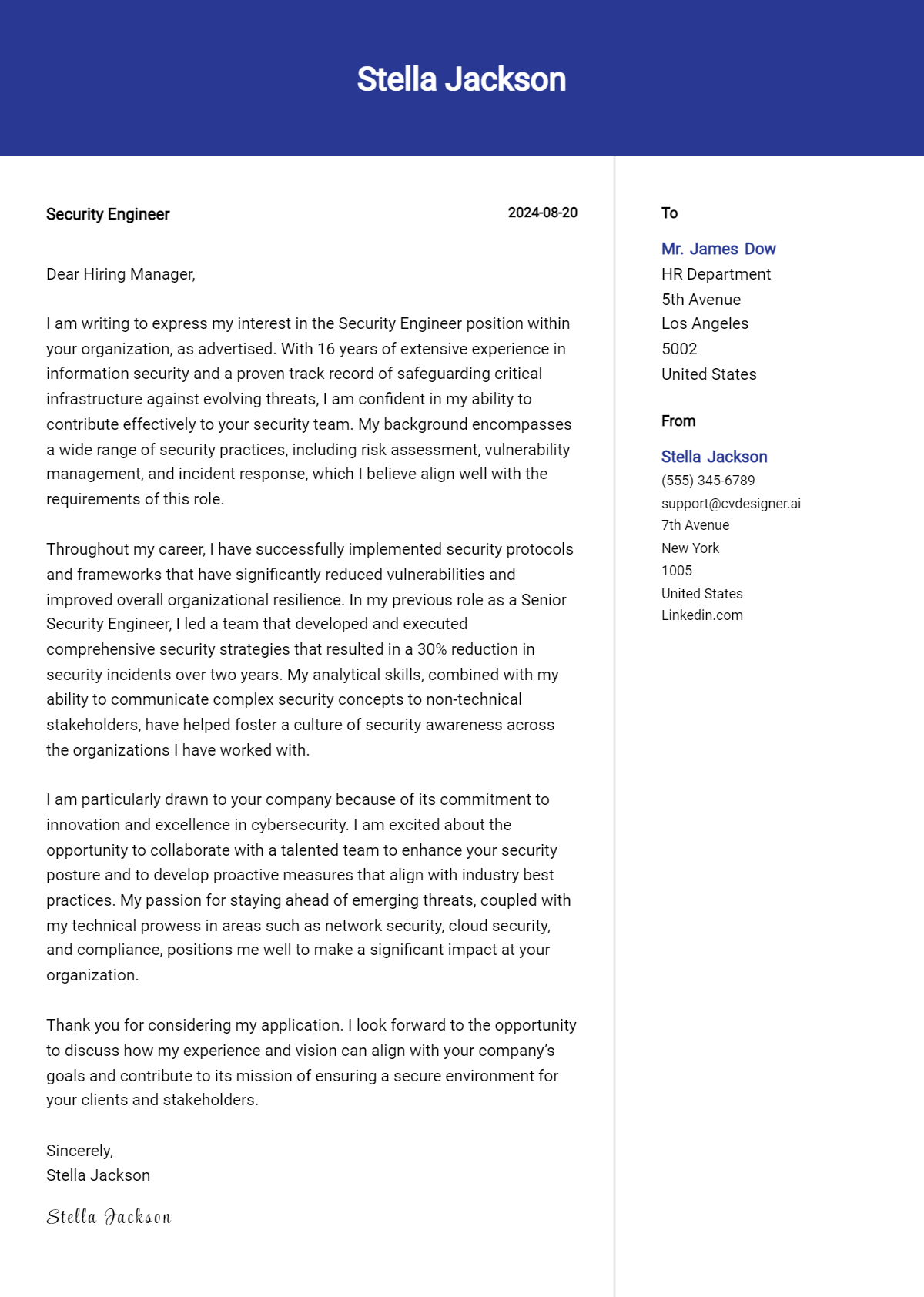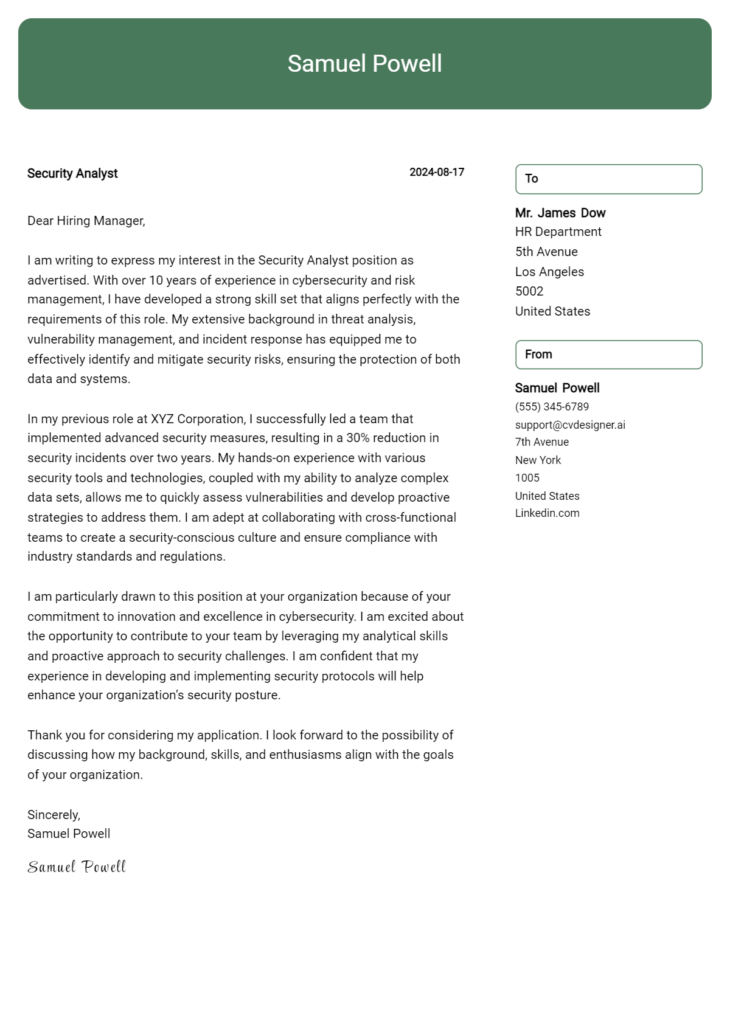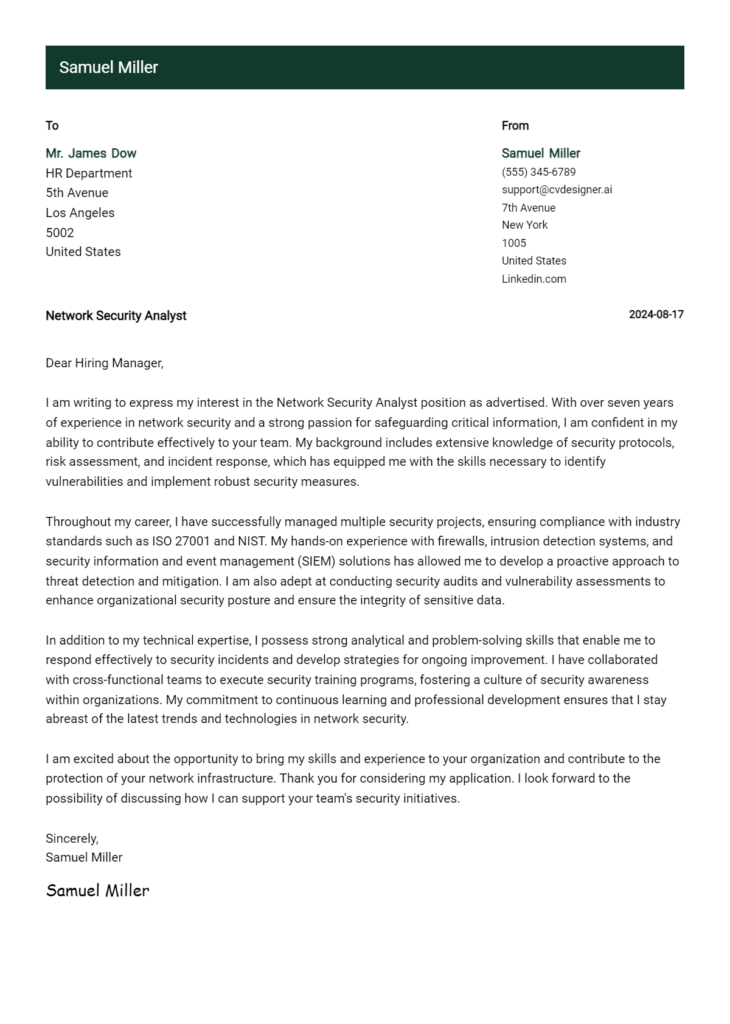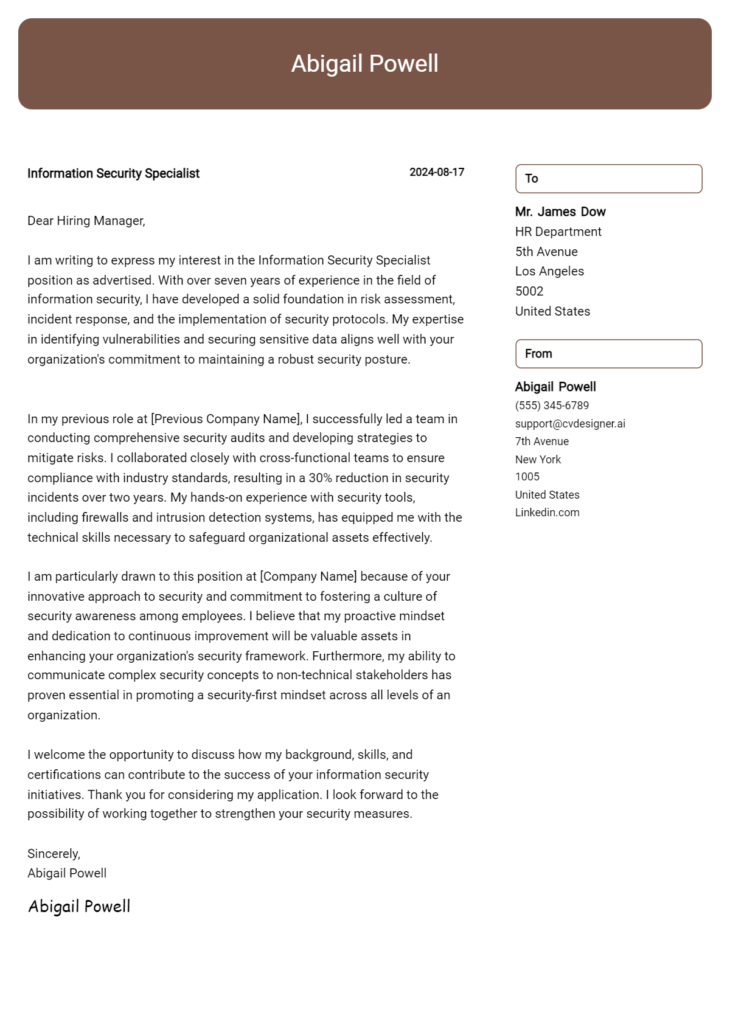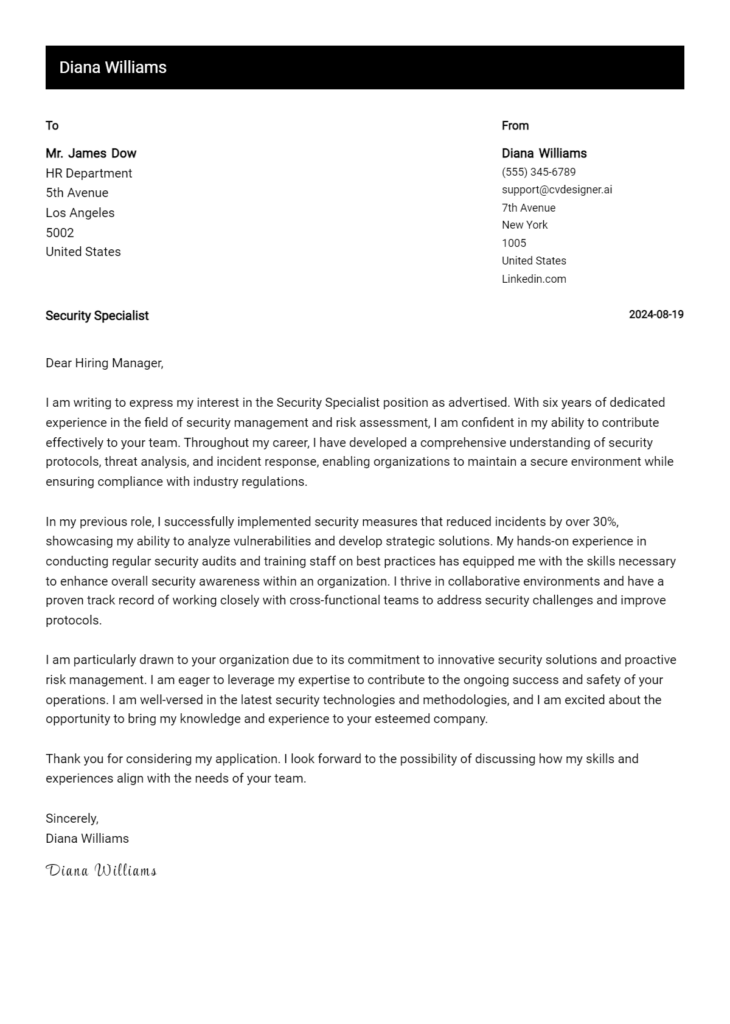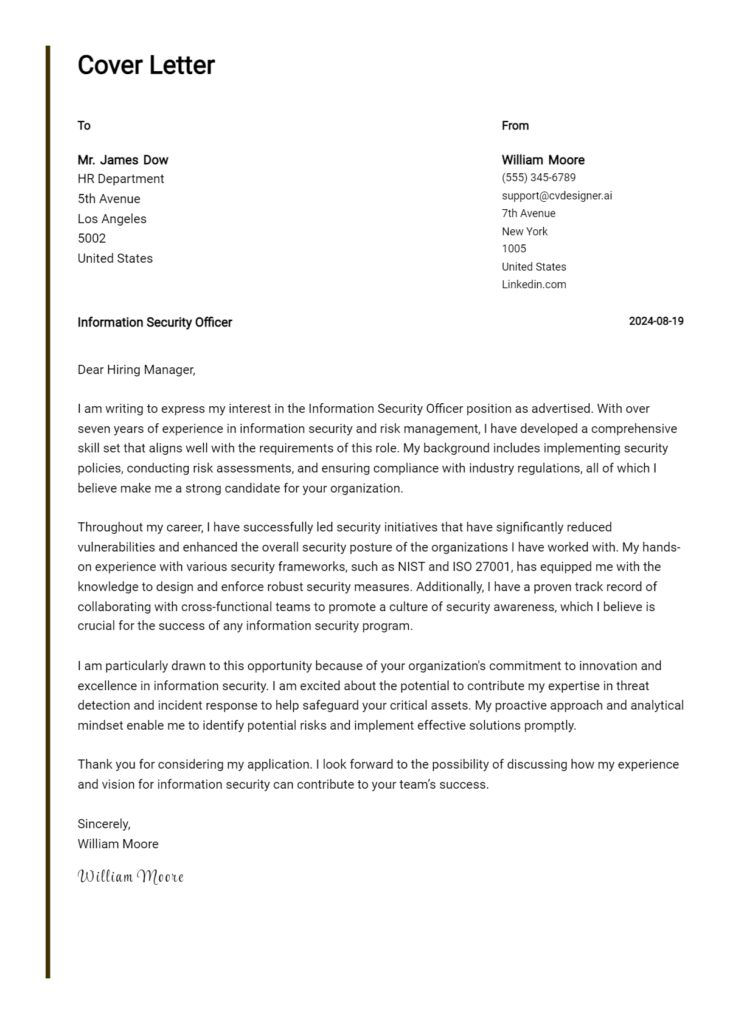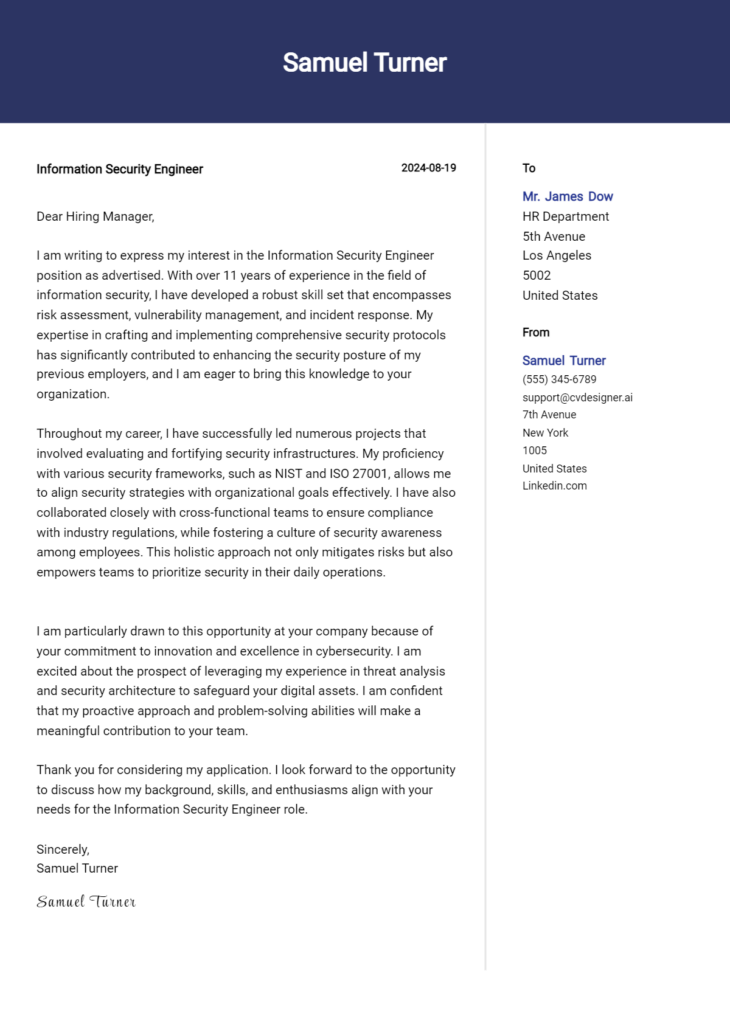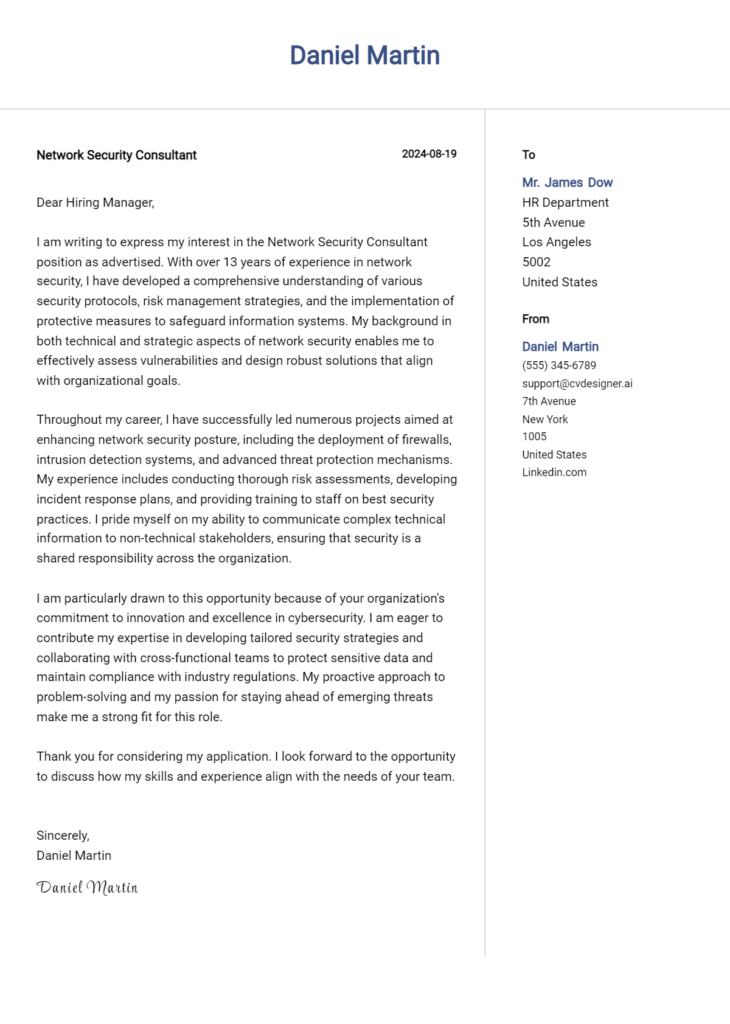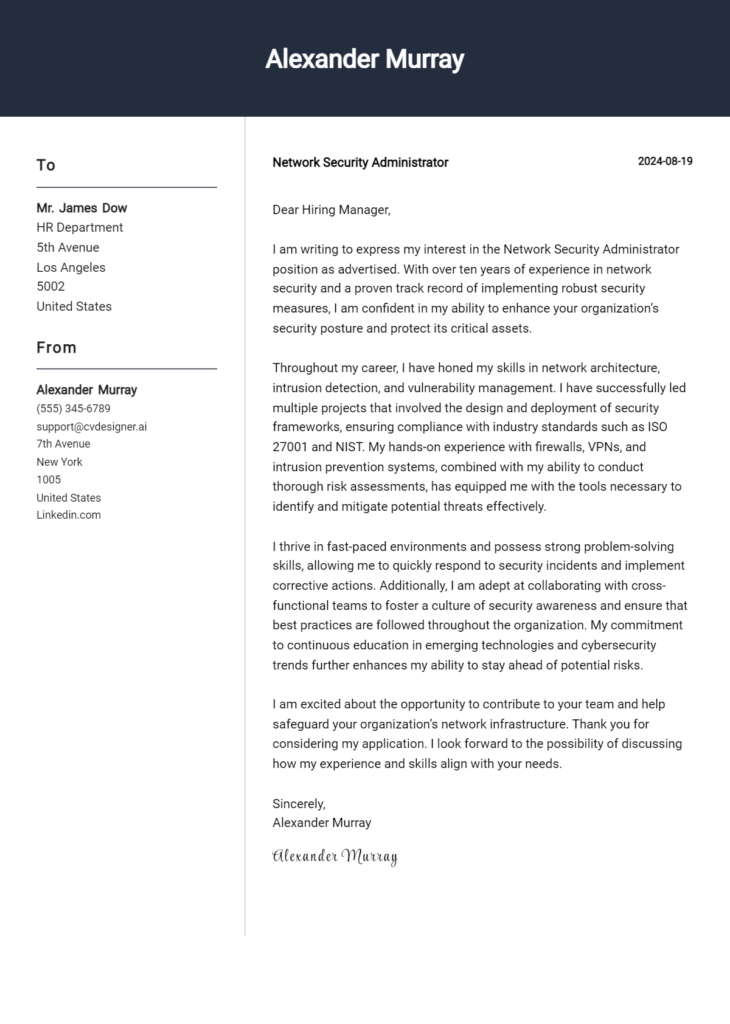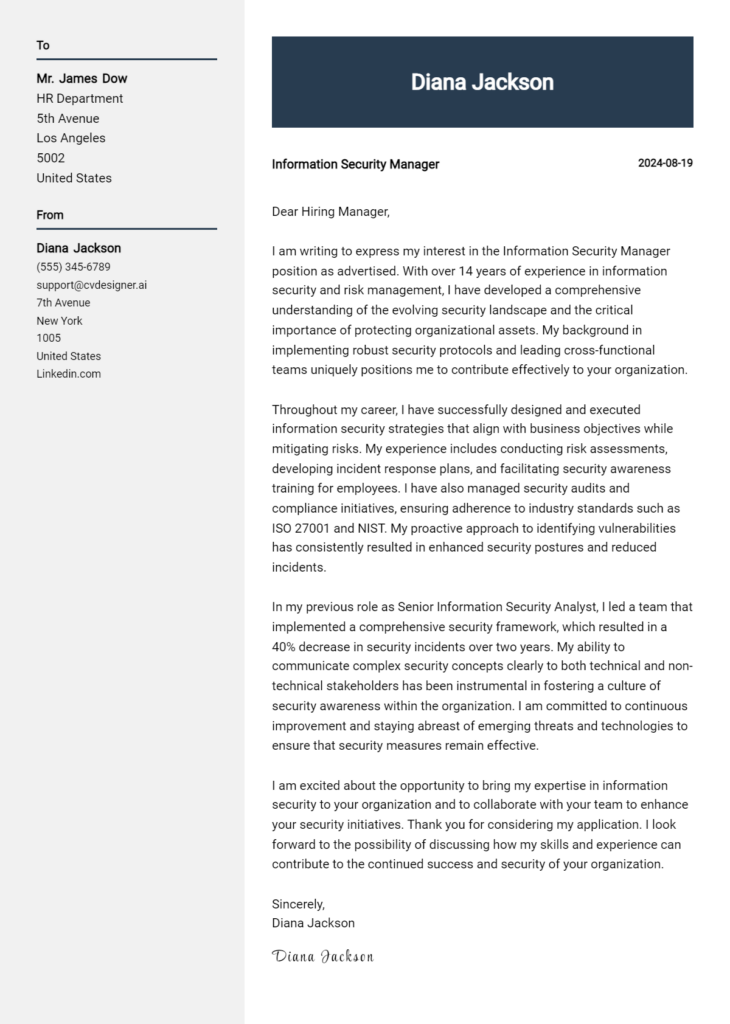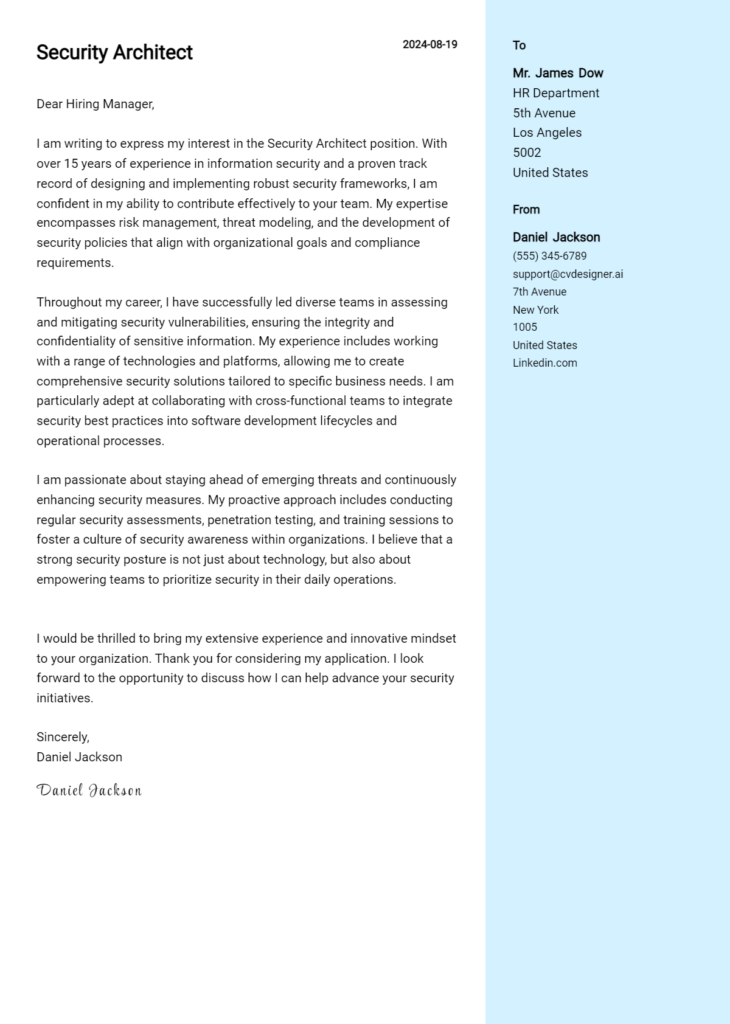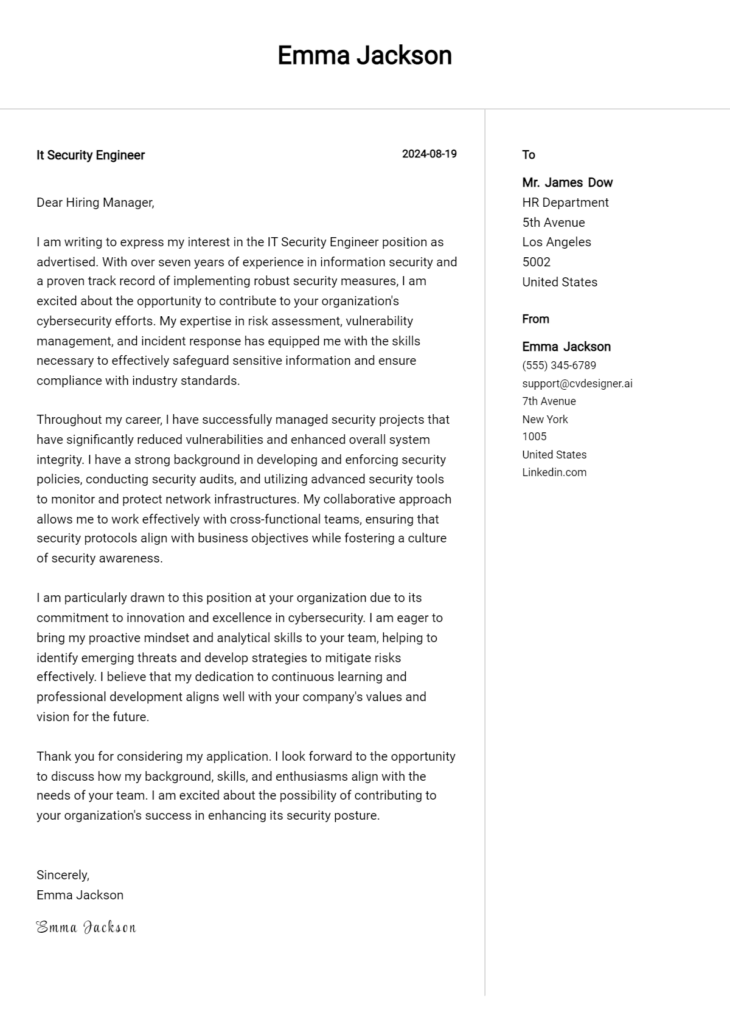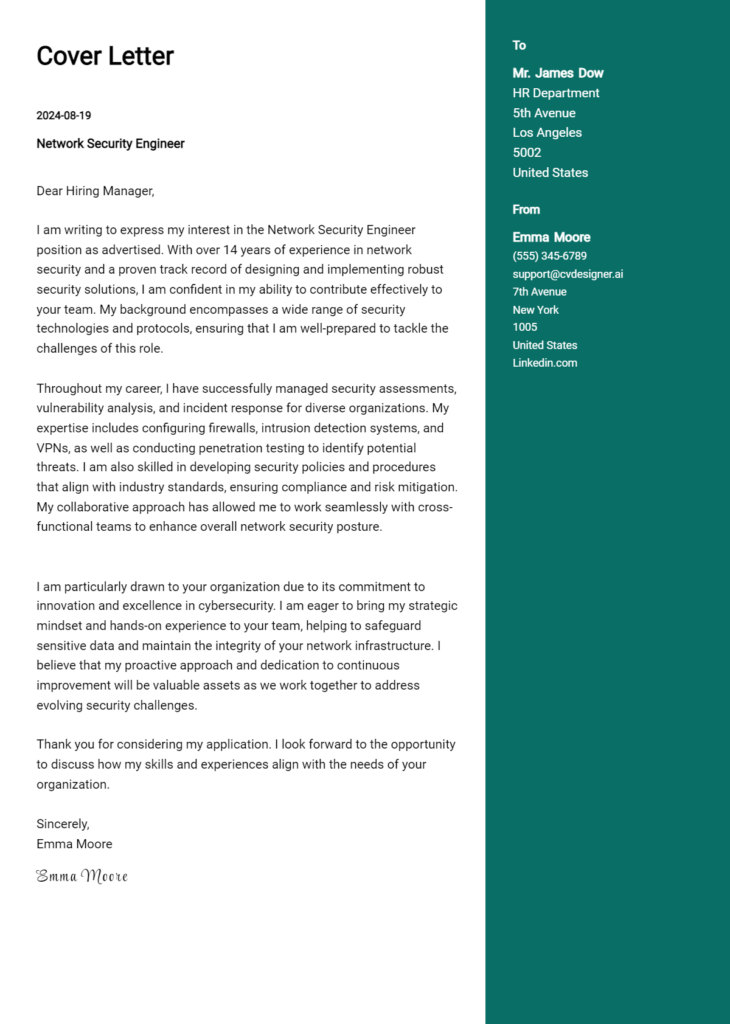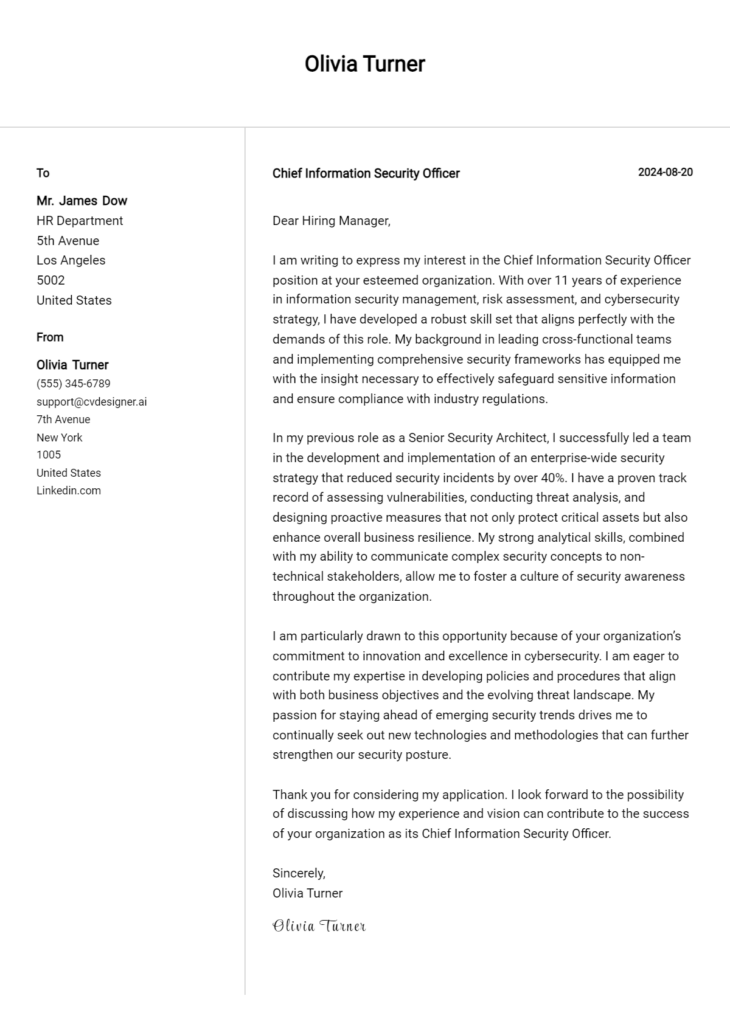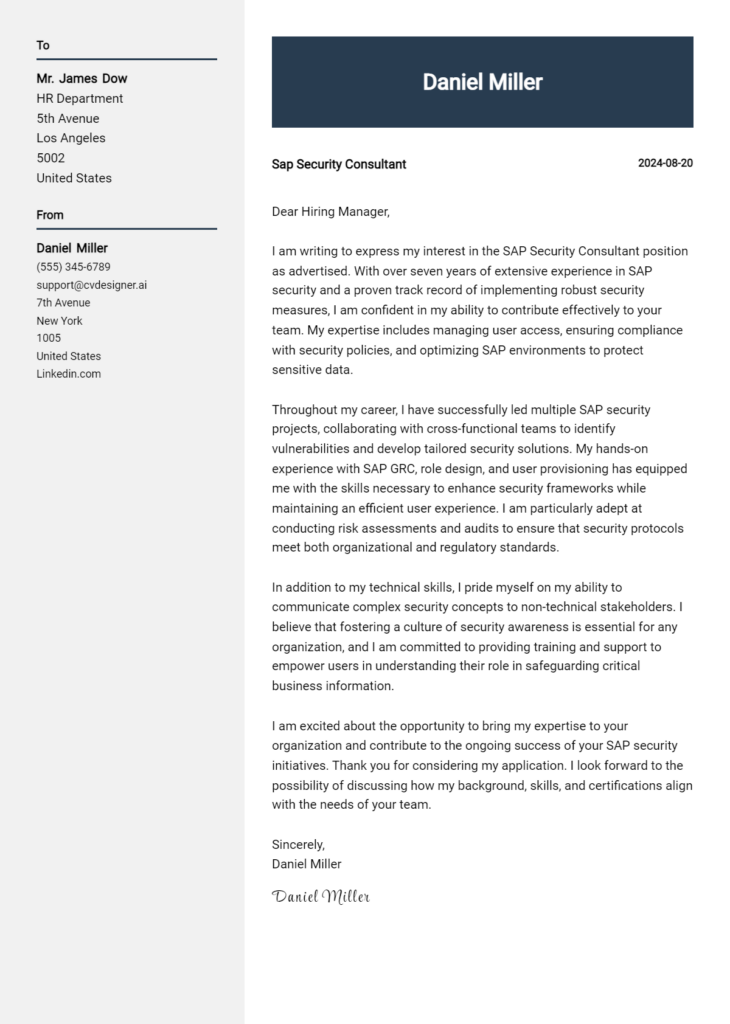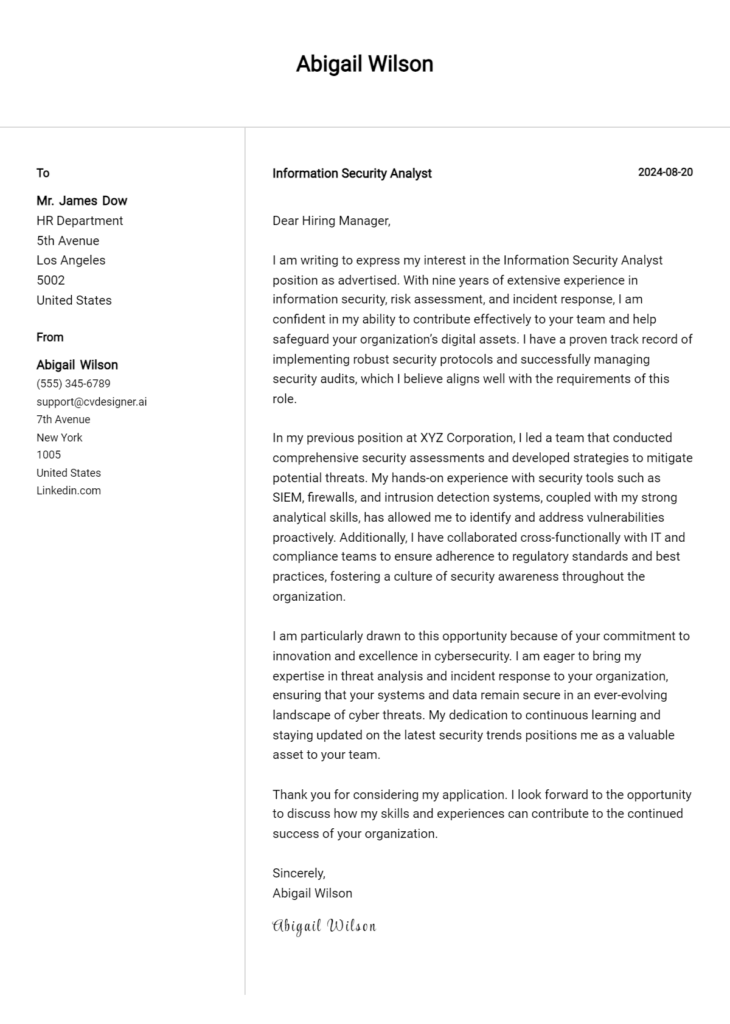Most Popular Security Engineer Cover Letter Examples
Explore additional Security Engineer cover letter samples and guides and see what works for your level of experience or role.
If you're looking to land a role as a Security Engineer, crafting a compelling cover letter is a crucial step in showcasing your qualifications and passion for the field. A well-structured cover letter not only introduces you to potential employers but also highlights your relevant skills and experiences, setting the stage for a standout application. In this article, we will guide you through the essentials of writing an effective Security Engineer cover letter, ensuring you present yourself as the ideal candidate. Here’s what you can expect to learn:
- What does a Security Engineer Cover Letter accomplish? Understand the purpose of your cover letter and how it complements your resume.
- Key Components of a Security Engineer Cover Letter: Discover the essential elements that should be included to make your letter impactful.
- Format a Security Engineer Cover Letter: Learn the best practices for formatting your cover letter to ensure clarity and professionalism.
- Three different level cover letter examples: Review tailored examples for entry-level, mid-level, and senior Security Engineer positions to inspire your writing.
- Common Mistakes to Avoid in a Security Engineer Cover Letter: Identify pitfalls that could weaken your application and how to steer clear of them.
- Key Takeaways: Summarize the critical points to remember as you draft your cover letter.
By the end of this guide, you’ll be equipped with the knowledge and tools to create a powerful cover letter that stands out in the competitive field of cybersecurity. Let’s dive in!
What does a Security Engineer Cover Letter accomplish?
A cover letter for a Security Engineer plays a crucial role in highlighting an applicant's relevant skills, experience, and understanding of cybersecurity principles, while also showcasing their passion for protecting an organization’s digital assets. It serves as a personalized introduction to potential employers, allowing candidates to elaborate on their technical qualifications and how they align with the company's security needs. A well-crafted cover letter can set a candidate apart from the competition by demonstrating not only their expertise but also their communication skills and attention to detail. To create an effective cover letter, it's beneficial to refer to a comprehensive cover letter guide and utilize a cover letter builder to streamline the writing process and ensure all key points are covered.
Key Components of a Security Engineer Cover Letter
- Introduction and Personalization: Start with a strong opening that includes your name and the position you are applying for. Mention the company name and express your enthusiasm for the role. Personalizing the letter can make a positive impression.
- Relevant Experience and Skills: Highlight your key qualifications, experience, and technical skills that are relevant to the Security Engineer position. Be specific about your previous roles, projects, and any certifications you hold that demonstrate your expertise in cybersecurity.
- Problem-Solving Abilities: Emphasize your ability to identify vulnerabilities, analyze risks, and implement effective security measures. Provide examples of how you have successfully addressed security challenges in the past, showcasing your analytical and problem-solving skills.
- Closing Statement and Call to Action: Conclude the cover letter by reiterating your interest in the position and your eagerness to contribute to the company’s security goals. Include a call to action, inviting the hiring manager to contact you for further discussion. For additional guidance on cover letter format and to see some cover letter examples, consider checking those resources for inspiration.
How to Format a Security Engineer Cover Letter
As a dedicated and skilled Security Engineer, crafting a compelling cover letter is essential for showcasing your expertise and aligning your qualifications with the needs of potential employers. Below are key points to consider when formatting your cover letter to make a strong impression:
- Personalize Your Greeting: Address the hiring manager by name if possible, demonstrating that you've done your research and are genuinely interested in the position.
- Strong Opening Statement: Begin with a powerful opening that captures attention, mentioning the specific role you’re applying for and expressing your enthusiasm.
- Highlight Relevant Experience: Briefly summarize your professional background, focusing on your experience in security engineering, including any specialized areas such as network security or incident response.
- Showcase Technical Skills: Mention specific technical skills and certifications relevant to the job, such as knowledge of firewalls, intrusion detection systems, or compliance standards like ISO 27001 or NIST.
- Demonstrate Problem-Solving Abilities: Provide examples of how you have successfully identified and mitigated security risks in previous roles, showcasing your analytical and problem-solving skills.
- Mention Collaboration and Communication: Emphasize your ability to work within a team, as well as your skills in communicating complex security concepts to non-technical stakeholders.
- Include Quantifiable Achievements: Whenever possible, use metrics to quantify your achievements, such as the percentage reduction in security incidents you achieved or the number of vulnerabilities you resolved.
- Express Knowledge of Industry Trends: Show that you stay updated on the latest security trends and technologies by mentioning recent developments in cybersecurity that you are familiar with.
- Conclude with a Call to Action: End your letter by expressing your eagerness for the opportunity to discuss your qualifications further and suggesting a follow-up meeting or conversation.
- Professional Closing: Use a respectful closing statement and include your contact information, ensuring it’s easy for the employer to reach out to you.
Security Engineer Entry-Level Cover Letter Example #1
I am writing to express my interest in the entry-level Security Engineer position at [Company Name] as advertised on [Job Board/Company Website]. With a recent degree in Cybersecurity from [Your University] and a strong passion for safeguarding information systems, I am eager to bring my skills and enthusiasm to your esteemed team.
During my academic career, I gained hands-on experience through various projects and internships that equipped me with a solid foundation in cybersecurity principles. In my senior capstone project, I led a team that developed a network security protocol for a simulated organization, successfully identifying vulnerabilities and implementing effective countermeasures to protect sensitive data. This experience honed my analytical skills and deepened my understanding of threat assessment and risk management.
Additionally, I completed an internship with [Previous Company/Internship Provider], where I assisted in monitoring security systems and responding to incidents. I collaborated with senior engineers to analyze potential breaches and participated in the implementation of security measures that improved the organization’s overall security posture. My ability to work effectively in a team environment and communicate complex security concepts to non-technical staff was recognized by my supervisors, further fueling my desire to pursue a career in this field.
I am particularly drawn to [Company Name] because of your commitment to innovation in cybersecurity solutions and your emphasis on professional development for employees. I am excited about the opportunity to contribute to your team, leveraging my technical skills and eagerness to learn in a fast-paced environment. I am confident that my academic background and internship experience make me a strong candidate for this position.
Thank you for considering my application. I look forward to the possibility of discussing how my skills and passion for cybersecurity align with the goals of [Company Name]. I am eager to contribute to your team and help enhance the security infrastructure of your organization.
Security Engineer Mid-Level Cover Letter Example #2
I am writing to express my interest in the Security Engineer position at [Company Name] as advertised on [Job Board/Company Website]. With over [X years] of hands-on experience in cybersecurity and a proven track record of implementing robust security measures, I am excited about the opportunity to contribute to your team and help safeguard your organization’s assets.
In my previous role at [Previous Company Name], I successfully designed and implemented security protocols that reduced vulnerabilities by over [X%]. I led a team in conducting comprehensive risk assessments and developed a tailored security framework that aligned with industry best practices. My experience with tools such as [specific tools or technologies, e.g., SIEM platforms, firewalls, intrusion detection systems] enabled me to effectively monitor, detect, and respond to threats in real-time. Additionally, I played a critical role in training staff on security awareness, which significantly enhanced our overall security posture.
I possess a strong understanding of compliance requirements, including [specific regulations such as GDPR, HIPAA, PCI-DSS], and have actively participated in audits to ensure adherence. My ability to communicate complex security concepts to both technical and non-technical stakeholders has been instrumental in fostering a culture of security within the organizations I’ve worked for. I am particularly proud of my initiative at [Previous Company Name] where I collaborated with cross-functional teams to streamline incident response processes, resulting in faster resolution times and minimized impact on operations.
I am eager to bring my expertise in threat assessment and vulnerability management to [Company Name]. I am particularly drawn to your commitment to innovation and proactive security measures, and I believe my skills and experiences align well with your goals. I look forward to the possibility of discussing how I can contribute to your team and help enhance your security initiatives.
Thank you for considering my application. I hope to discuss my candidacy further and explore how I can add value to [Company Name]. Please feel free to contact me at [Your Phone Number] or [Your Email Address] to arrange a convenient time for a conversation.
Security Engineer Experienced Cover Letter Example #3
I am writing to express my interest in the Security Engineer position at [Company Name] as advertised on [where you found the job listing]. With over [X years] of experience in cybersecurity and a proven track record of successfully implementing secure systems and protocols, I am excited about the opportunity to contribute to your team.
In my previous role at [Previous Company Name], I led a team of security specialists in conducting comprehensive security assessments and vulnerability analysis for our critical infrastructure. My efforts resulted in a 40% reduction in security incidents over two years, achieved through the development and execution of a robust security framework that prioritized risk management and compliance with industry standards such as ISO 27001 and NIST. My hands-on experience with penetration testing and incident response has equipped me with the skills to identify potential threats and mitigate risks effectively.
One of my key projects involved the deployment of a multi-layered security approach that integrated advanced threat detection systems and endpoint protection solutions. By collaborating with cross-functional teams, I was able to enhance our incident response capabilities, which significantly improved our overall security posture. Additionally, I have extensive experience with cloud security, having successfully migrated critical applications to a secure cloud environment while ensuring compliance with regulations and best practices.
I am also passionate about continuous learning and professional development, which is reflected in my numerous certifications, including CISSP, CEH, and CISM. I believe that staying abreast of the latest security trends and technologies is vital in this ever-evolving field. I am eager to bring my expertise in risk assessment, security architecture, and threat intelligence to [Company Name] and contribute to safeguarding your digital assets.
Thank you for considering my application. I am looking forward to the opportunity to discuss how my background, skills, and enthusiasms can align with the goals of your team. I am excited about the possibility of contributing to [Company Name] and am available at your earliest convenience for a discussion.
Cover Letter Tips for Security Engineer
When crafting a cover letter for a Security Engineer position, it is essential to showcase not only your technical skills and relevant experience but also your understanding of the evolving landscape of cybersecurity threats. Highlight your problem-solving abilities and detail any specific projects or initiatives where you have successfully implemented security measures or responded to security incidents. Use the cover letter to convey your passion for protecting information systems and your commitment to staying updated on industry trends. Personalize your letter for each application by addressing the company's specific needs and demonstrating how your expertise aligns with their goals.
Cover Letter Tips for Security Engineer:
- Tailor Your Content: Customize your cover letter for each job application, addressing the specific requirements and challenges mentioned in the job description.
- Highlight Relevant Experience: Focus on previous roles or projects where you successfully implemented security protocols, conducted risk assessments, or responded to incidents.
- Showcase Certifications: Mention any relevant certifications like CISSP, CISM, CEH, or CompTIA Security+ that demonstrate your expertise and commitment to the field.
- Quantify Achievements: Use metrics to highlight your accomplishments, such as “reduced security incidents by 30%” or “improved response time by 40%.”
- Demonstrate Soft Skills: Security Engineers often work in teams and must communicate with non-technical stakeholders, so include examples of your teamwork, communication, and leadership skills.
- Express Continuous Learning: Emphasize your commitment to staying current with industry trends, emerging threats, and new technologies through ongoing education and professional development.
- Use Technical Language Wisely: While it’s important to demonstrate your technical knowledge, ensure that your language remains accessible to recruiters who may not be deeply technical.
- Conclude with Enthusiasm: End your cover letter with a strong closing statement that reiterates your interest in the position and your eagerness to contribute to the company’s security goals.
How to Start a Security Engineer Cover Letter
As you embark on your journey to write a compelling cover letter for a Security Engineer position, it's crucial to start with a strong introductory paragraph that captures the attention of hiring managers. Below are several examples of effective introductions to inspire your own writing.
With a robust background in cybersecurity and a passion for safeguarding digital assets, I am excited to apply for the Security Engineer position at [Company Name]. My experience in developing and implementing security protocols has equipped me with the skills necessary to protect your organization's sensitive information.
I am writing to express my interest in the Security Engineer role at [Company Name]. With over five years of experience in the field and a proven track record of successfully mitigating security threats, I am eager to contribute my expertise to your esteemed organization.
As a dedicated cybersecurity professional with a deep understanding of both network security and incident response, I am thrilled to apply for the Security Engineer position at [Company Name]. My ability to analyze vulnerabilities and develop robust security measures has consistently resulted in enhanced safety for past employers.
I am excited to submit my application for the Security Engineer position at [Company Name]. My comprehensive experience in risk assessment, threat modeling, and security architecture design positions me as an ideal candidate to protect your critical systems and data.
With a commitment to excellence in cybersecurity and a strong foundation in security best practices, I am eager to join [Company Name] as a Security Engineer. My hands-on experience in vulnerability assessment and penetration testing has prepared me to effectively safeguard your organization against emerging threats.
How to Close a Security Engineer Cover Letter
As you conclude your cover letter for a Security Engineer position, it’s essential to leave a lasting impression that reinforces your enthusiasm and qualifications. Here are some effective closing statements you can consider:
“I am eager to bring my expertise in cybersecurity and risk management to your esteemed organization and contribute to a safer digital environment.”
“Thank you for considering my application; I look forward to the opportunity to discuss how my skills in network security and incident response can benefit your team.”
“I am excited about the possibility of collaborating with your talented team to strengthen your security posture and safeguard critical assets.”
“I appreciate your time and consideration, and I am looking forward to the chance to discuss how my background in threat analysis can help advance your security initiatives.”
Common Mistakes to Avoid in a Security Engineer Cover Letter
When crafting a cover letter for a Security Engineer position, it’s essential to present yourself as a knowledgeable and skilled professional who understands the intricacies of cybersecurity. A well-structured cover letter can set you apart from other candidates, but common pitfalls can undermine your efforts. To help you create a compelling application, here are some common mistakes to avoid.
- Failing to customize the cover letter for the specific job and company.
- Using generic language or clichés that lack specificity about your skills and experiences.
- Neglecting to highlight relevant certifications, such as CISSP, CEH, or CompTIA Security+.
- Overlooking the importance of demonstrating a clear understanding of the company's security challenges.
- Not providing concrete examples of past achievements or projects related to information security.
- Using technical jargon excessively without explaining its relevance to the role.
- Ignoring the importance of a strong opening and closing statement, which can leave a lasting impression.
- Making grammatical errors or typos that can signal a lack of attention to detail.
- Failing to convey enthusiasm for the role and the organization, which can make your application seem less genuine.
- Not including a call to action, such as expressing a desire for an interview or further discussion.
Key Takeaways for a Security Engineer Cover Letter
In crafting a compelling cover letter for a Security Engineer position, it is essential to highlight your technical expertise, problem-solving abilities, and experience in safeguarding information systems. Start by showcasing your proficiency with security protocols and technologies, emphasizing any relevant certifications you hold. Discuss specific projects where your contributions have led to significant improvements in security posture, ensuring that you align your skills with the requirements of the job you are applying for. This targeted approach will demonstrate your value to potential employers and set you apart from other candidates.
To further enhance your cover letter, consider utilizing cover letter templates that can provide a professional format and structure. Additionally, a cover letter builder can simplify the writing process, allowing you to focus on the content while ensuring your letter is polished and effective. By combining your unique experiences with these resources, you will create a powerful narrative that resonates with hiring managers and showcases your readiness for the challenges of a Security Engineer role.
